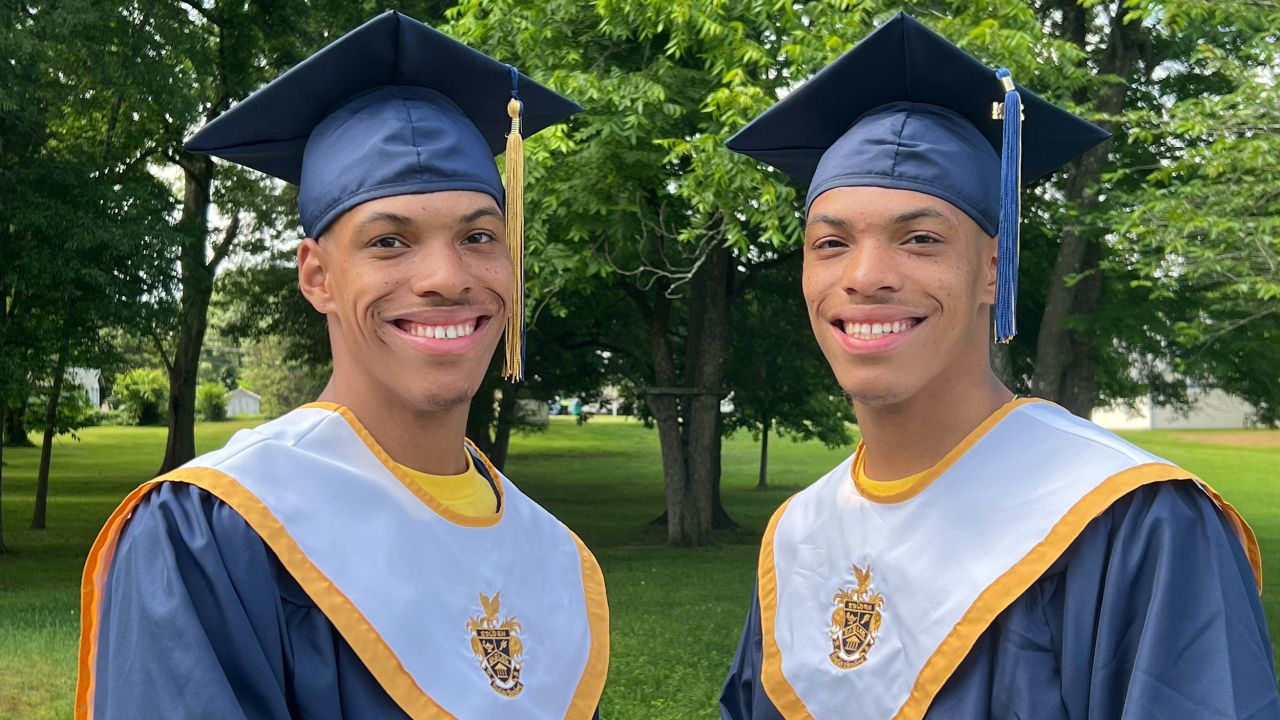The milestone unfolding here this week would have seemed unfathomable in the chaos nearly 19 years ago, when the US Army lieutenant general with the booming voice first met the twin babies.
The infant boys were starving and dehydrated, nearly limp in the suffocating heat in the days after Hurricane Katrina defeated New Orleans’ levee system, flooded its streets and killed many of the 1,392 people across the region who’d ultimately succumb to its horrors.
Their mom, Alexandria Wheeler, had run out of formula to feed them and so decided finally to venture out for help that by then clearly wasn’t coming for her.
“It was like being in a third world country on United States soil,” she recalled to CNN. She walked a long time to get to dry land. Then, she saw him: combat uniform, black beret, aviator glasses.
“This man comes around the corner to our rescue,” Wheeler said of a moment that soon would become an icon of the Crescent City’s freshly ravaged streets. “It was like God just coming in, stepping in out of nowhere.”
Lt. Gen. Russel Honoré and his crew quickly scooped up A’Mari and J’Mari Reynolds, each in nothing but a diaper and a tiny navy baseball cap.
The encounter didn’t last long, but it would prove momentous: a young family’s first step toward a future that would include another flood but also many bright twists before the latest chapter came into focus hundreds of miles away with the Reynolds twins again poised to meet Honoré.
This time they wore navy mortarboards and matching gowns as they got ready to line up for their graduation from Eagle’s Landing High School near Atlanta. But first, they had to take a video call, one almost two decades in the making.
Before they walked across the stage Wednesday to collect their diplomas, they had to deliver a message to a certain Bronze Star recipient – now 76 and retired – about how grateful they were to him. They had to tell him how his legacy was now wrapped up in the plans they had for their own futures. Their mom wanted to see his face when they told him.
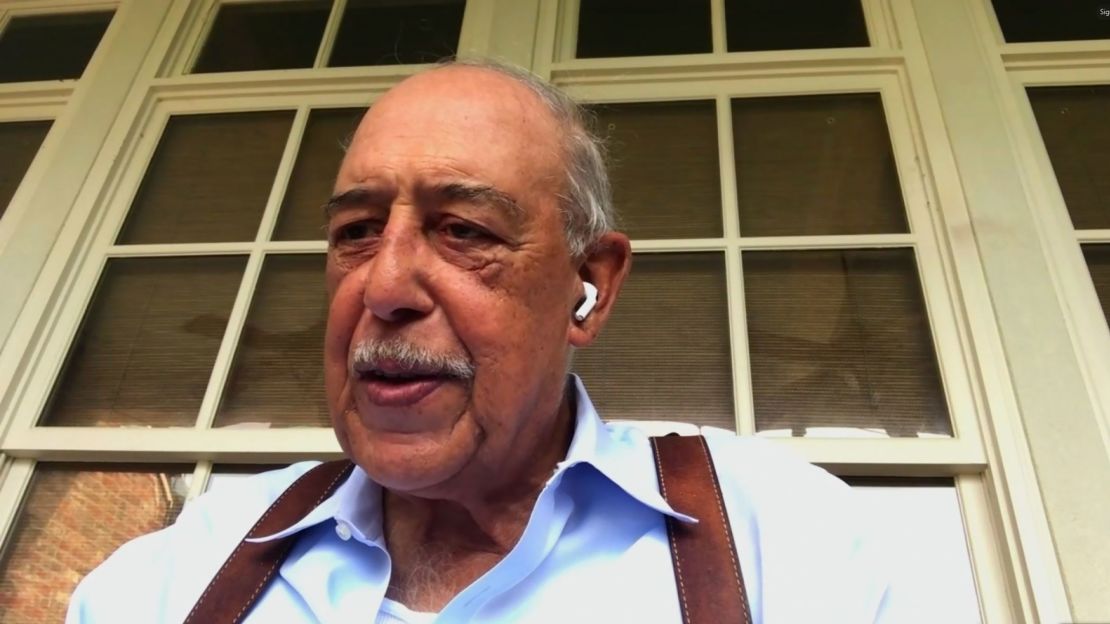
A’Mari and J’Mari stared at the laptop on a picnic table near the commencement venue when his image blinked onto the screen from Louisiana: open collar, dark suspenders, a few more creases around his brown eyes.
“Wow! Nineteen years ago, boys! Now, look at you two young men,” Honoré said before diving right back to the moment they met: “You were toddlers on Poydras and Convention street when your mom was walking down the street with you, one in each arm.
“And as we walked up toward her, myself and two soldiers, she started to lower her arms,” he told them. “She had become exhausted from carrying you.”
‘Put those weapons down, dammit!’
In those desperate, sweltering, early days of New Orleans’ great flood of 2005, Wheeler – like so many survivors – had been far more concerned for her children than herself.
“We hadn’t eaten in maybe six days” when the mother started making her way to the makeshift shelter at the Superdome – one 6 ?-month-old strapped to her chest, the other on her back.
Wheeler waded through murky water that hid horrors, including one she bumped under the surface: “It was two bodies, collided,” she told CNN a few years later. “Their arms were stretched out. They were full of water, and they raised up to the top from me lifting my leg up.”
When mom and boys finally made it to the stadium, though, supplies were scant. So, a desperate Wheeler headed to Harrah’s casino a couple blocks away. But military personnel with guns drawn stopped them.
Terror and confusion hit Wheeler.
“We’re the victims,” she recalled thinking. “What are you pulling guns on us for?”
That’s when she first heard his voice:
“Put those weapons down, dammit!”
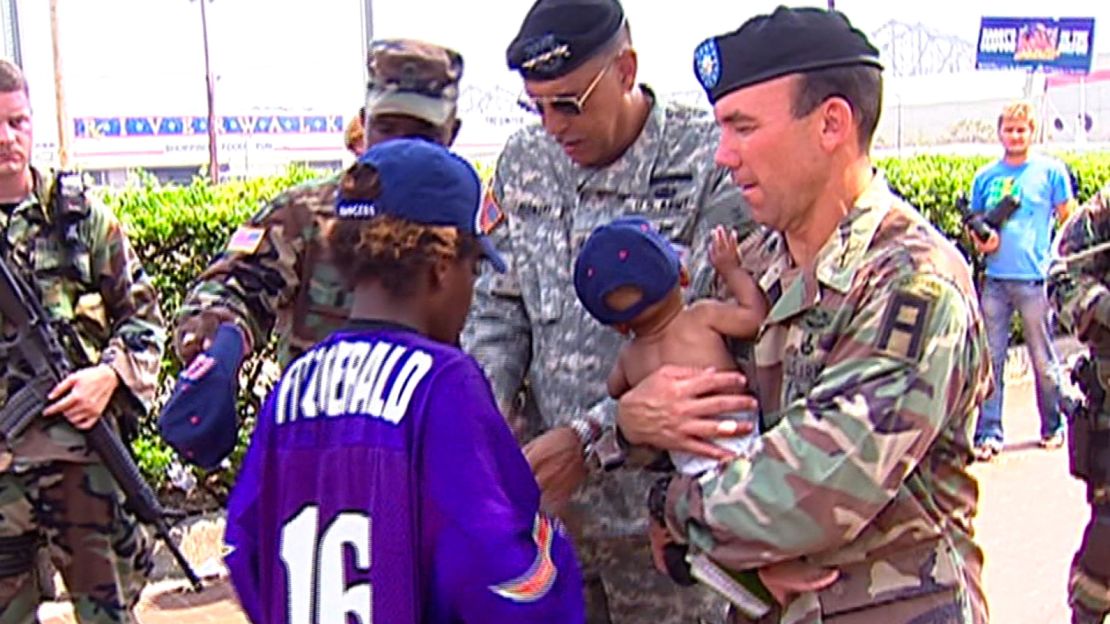
It was Honoré, the Louisiana native dispatched to lead the Defense Department’s response to Hurricanes Katrina and soon Rita; CNN cameras captured the moment.
“He was like God’s angel,” Wheeler said.
Firearm barrels lowered.
Then, Honoré saw the mom with her tiny sons: “Me and my team, I knew we had to reach out and help these babies.”
‘There’s no question. We would have died’
Their rescue, in Honoré’s view, had been fate: In a city without drinkable water or electricity, a US Coast Guard vessel had docked just two blocks away; a medevac aircraft was available; and a system was in place to spirit the most dire patients to Louisiana’s capital, then on to Texas, for aid.
“This was meant to happen,” he said, hesitating even to imagine an alternative too “unconscionable to think about.”
The lieutenant general then spent about four hours with Wheeler and her twins, cradling A’Mari and J’Mari before the family was en route to San Antonio, she said.
“They were completely dehydrated. Their veins – everything – it was really hard for them to put in IVs,” Wheeler recalled, adding her sons were in the hospital for a week and a half.
“A’Mari actually coded blue, and then J’Mari went directly after him.”
Honoré is the only reason they made it, Wheeler said.
She is sure of it.
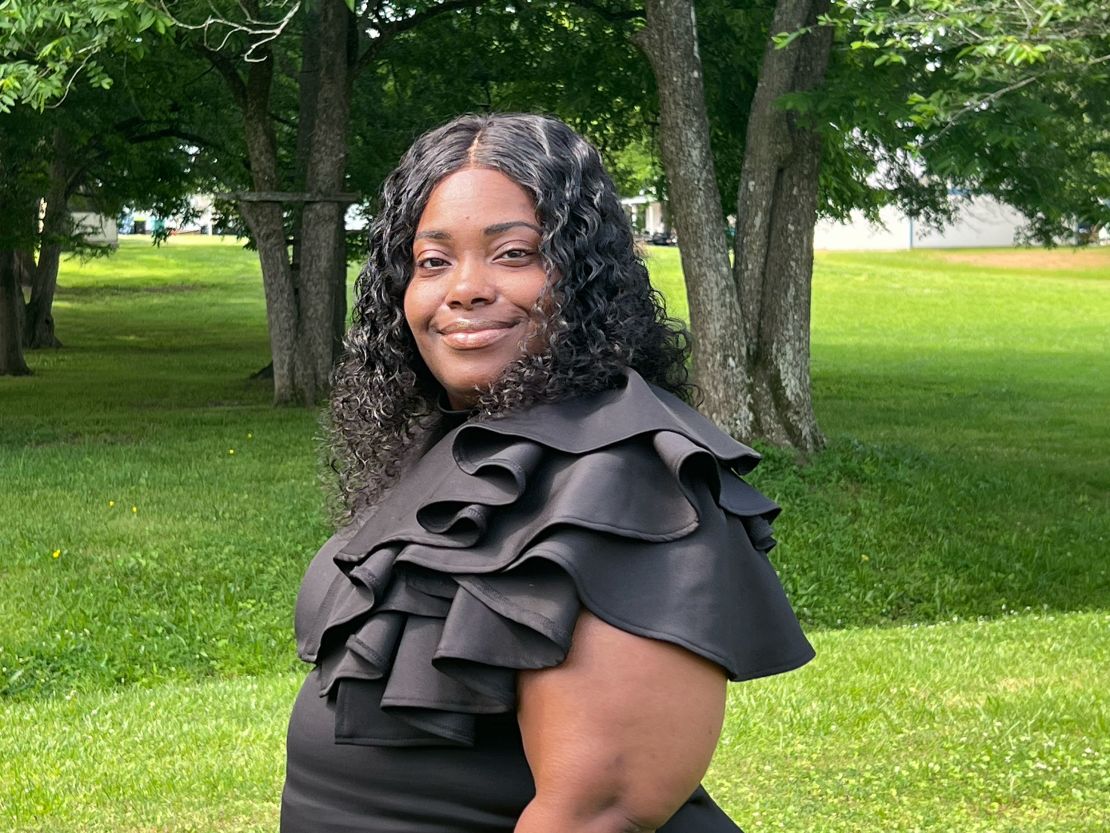
“We would have died,” she said. “There’s no question. We would have died.”
Meanwhile, Honoré’s encounter with the Reynolds twins left him “inspired … to move faster,” he said this week. “We had to do this quicker, faster, better … because I knew that there would be other babies out there that were not as lucky as us to have this moment where all things came together.”
‘You guys grew up in 12 years!’
A’Mari and J’Mari grew up recounting the story of their deliverance, telling and retelling it with their mom and watching and rewatching the video of their tiny selves getting handed to Honoré and his team before their flight to safety.
But it would take another dozen years – and another monster storm – to give the boys and their mother the chance to thank Honoré for all he’d done to help them.
Hurricane Harvey threatened the family’s Houston apartment in 2017 as it directly killed 68 people in Texas and did more than $150 billion in damage. The storm’s aftermath also drew a certain lieutenant general, by then retired but still vocal about how best to respond to the changing climate’s power to destroy – and still known for leading with his heart.
Thankfully, Harvey’s water didn’t enter Wheeler’s home. But when she heard Honoré was in Texas, she sent him a message on social media.
He responded.
The four of them reunited, with the twins rushing to the military man to thank him “for saving our lives.”
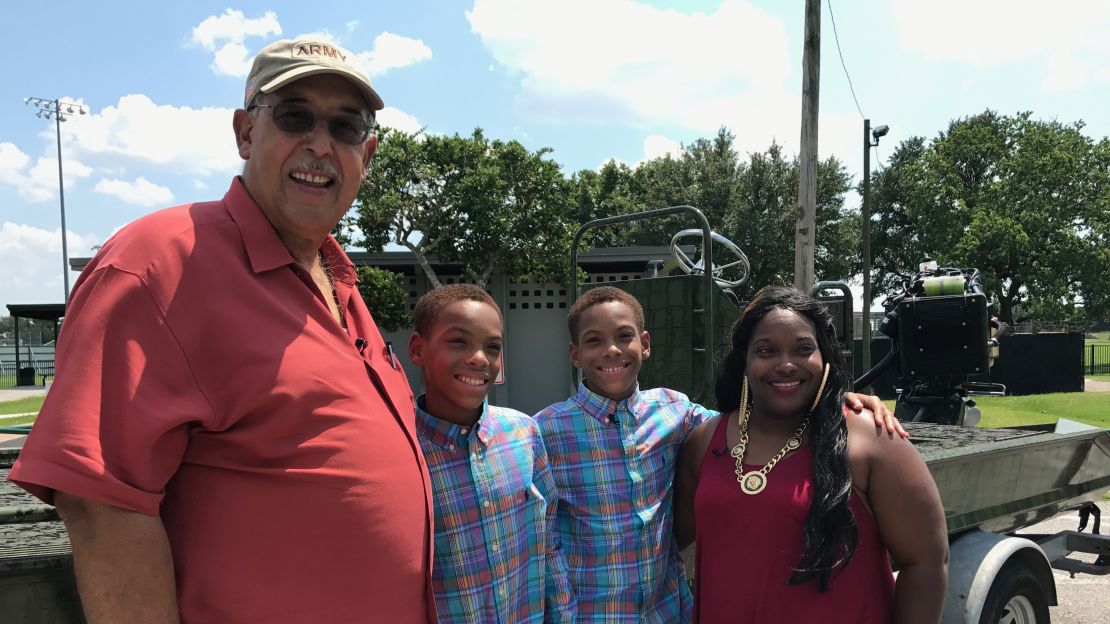
Honoré put his arms around them all.
“Boy, you guys grew up in 12 years!” he said.
Then, the decorated soldier – with degrees from Southern University and A&M College and Troy State University – quizzed the twins in a key category for middle school students, cultivating a seed already taking root in their young minds:
Where did they plan to go to college?
Though the boys and Honoré stayed in touch from then on, it would be another seven years before they could give him answers to that critical question.
‘Why I’m still standing here today’
Sitting at the picnic table outside Atlanta in their graduation gowns, the Reynolds twins leaned into the laptop screen Wednesday to speak directly to the man whose lessons they’d begun to learn long before either could remember.
A’Mari spoke to Honoré first: “I would like to take a moment to give you my deepest gratitudes because your kindness, commitment and bravery during Hurricane Katrina is the reason why I’m still standing here today.
“Thanks to you, it inspired me,” he said, “and you played a pivotal role in my life, and thanks to you, I’ll be a future addition to the United States Marine Corps.”
“Ooh-rah!” the career Army man responded with the other branch’s battle cry. “You’re gonna learn how to say that word: Ooh-rah.
“Congratulations,” he continued. “That’s a great move. Best marines in the world. You’re going to a great outfit, and you’ll come out stronger than you went in.”
Next up was J’Mari: “I would also like to … thank you so much for your bravery and your help that I was able to survive. You gave me at least a bunch of hope that there’s still good in the world, and it gave me a chance to change mentally and physically, where I would be nice to other people, I would help others in need of help.
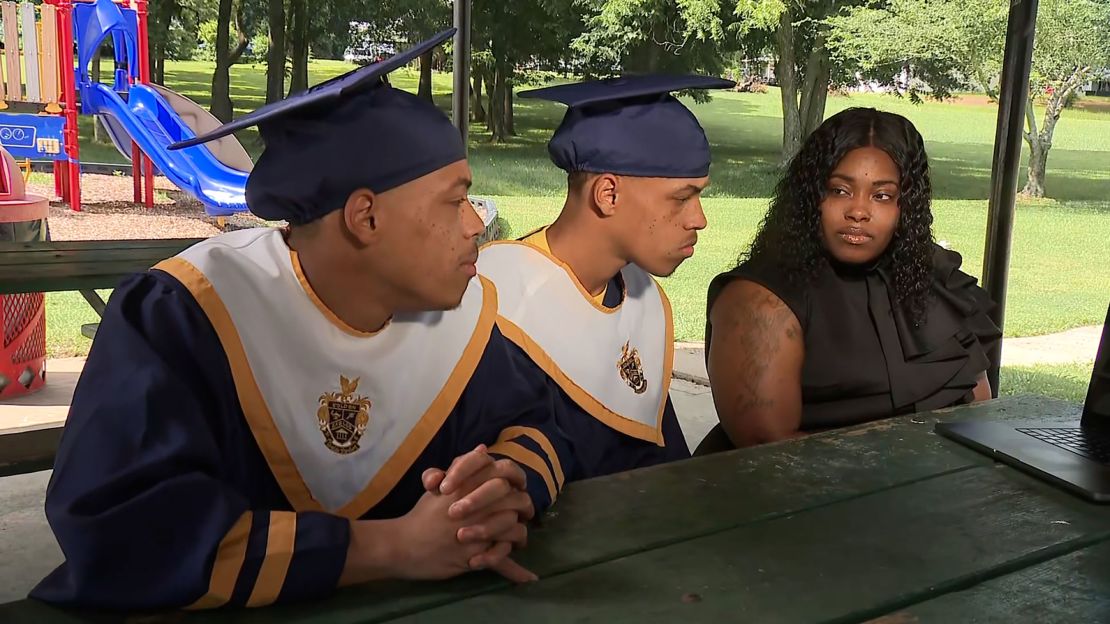
“I’m going to college to do automotive engineering,” he declared. “I want to help other people and make sure everything is safe for them.”
Honoré retook the floor – and again raised the stakes: “Well, thank you and good luck. I look forward to you inventing things that will make the world safer from climate change … because the opportunities are there to change the world with the education you’re gonna get and help save the planet.”
Wheeler, for her part, watched it all unfold, including the look on the retired lieutenant general’s face. He also had a message for her: “You done good!” he told A’Mari’s and J’Mari’s mom. “They’re here today because of you and your tenacity and your willingness to fight for them.
“When we saw you on the streets of New Orleans, you motivated the entire United States military to do more and do it quicker and do it better. We are here with admiration today because you inspired us.”
Wheeler thanked him, too – for insisting those soldiers put down their guns, for affirming their survival in Houston, for “changing our lives forever.” They could never find words enough to thank him, she said, or do enough to repay him.
The score, however, didn’t seem like one that needed settling. The first steps of the paths the Reynolds twins now had chosen might well have been lain right there at the corner of Poydras Street, when their exhausted mom happened upon an angel in fatigues.
“I feel so gratified,” Honoré said. “The engineer … can have the capability to change the world, and the Marine that’s going into national service to help protect our freedom and our democracy.
“These young men,” the retired Army man said of the babies he once saved from the teeth of a deadly flood, “will be game changers.”





